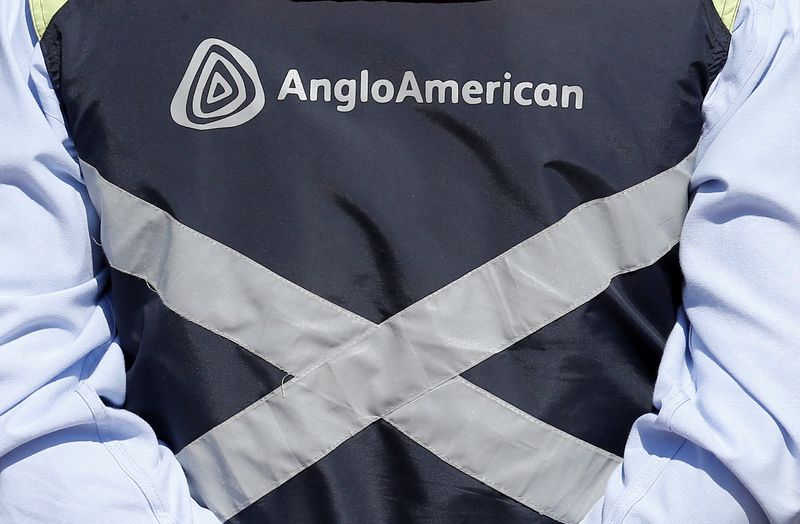By Felix Njini and Clara Denina
JOHANNESBURG/ LONDON (Reuters) - Days after miner BHP launched its takeover bid for rival Anglo American (JO:AGLJ) in April, the CEOs of both headed for South Africa, where a condition to divest Anglo's local platinum and iron ore assets was causing a political storm.
More than 20% of Anglo shares are held by South African investors, and the London-listed group's presence is deemed of national value in the country, where it was founded in 1917 and employs more than 40,000 people.
While Anglo CEO Duncan Wanblad appears to have so far succeeded in enlisting support for his new turnaround strategy, the trip did not work out as well for BHP, which had been caught on the back foot by details of the offer being leaked.
After it bowed out of the deal on Wednesday, more than half a dozen people, including investors and ex-mining executives, told Reuters that Anglo was able to rebuff BHP's approaches because the bigger group could not persuade key shareholders including South Africa's Public Investment Corporation to back it.
"It's a combination of a structure that would have been extremely challenging to implement, which has significant risk embedded in it, and a lack of sensitivity to the environment in South Africa," said one source familiar with Anglo's defence strategy. "All of which, by the way, (could have been) anticipated."
In his first public comments on the takeover bid, BHP CEO Mike Henry told investors at a mining conference in Miami that "our strong preference was to be able to hold these discussions with Anglo in private".
"Rather unfortunately, it got leaked," he added. "So the first thing I did was jump on a plane."
Henry flew to South Africa with his London banking advisors on May 1, hoping to calm investors after the April 24 leak. He also hoped to meet the government to fully communicate the strategy, a source familiar with the matter said.
South Africa's government had been caught off-guard a month before an election by a takeover offer for a company deeply entrenched in the national economy, and mines minister Gwede Mantashe sharply criticised the plan to buy Anglo and spin off its South African assets.
The source said the Australian miner had no intention of announcing the approach while South Africa was going through an election. "It should have been played out between the companies," they added.
Henry has made no secret of his drive to get Anglo's giant copper mines in Latin America, where BHP also owns assets.
A former director of AngloGold Ashanti, once listed in Johannesburg, said Anglo had known BHP's demands that Anglo Platinum and Kumba Iron Ore be unbundled immediately if a deal went through would face opposition.
BHP's calculations underestimated the company's deep ties to South Africa, said Mandi Dungwa, a portfolio manager at Camissa Asset Management in Cape Town.
"There is just a certain way these deals are done, particularly in South Africa, with the sensitivities government has - especially when it seems you want to take something away."
PLAY ON LEGACY
Anglo CEO Duncan Wanblad was meanwhile able to enlist support for his new strategy, unveiled two weeks later, which includes a spin-off of the same platinum mines in South Africa and the sale of coal and diamond assets.
At around the same time Henry was flying into South Africa, Wanblad headed to Pretoria, where he had secured a meeting with Mantashe, who also chairs the governing African National Congress party.
Anglo, which rejected all of BHP's proposals, including an increased $49 billion one, focused its defence strategy on the value of the deal, playing up how the costs of untangling its South African units would be borne by investors.
Wanblad's offer to retain iron ore assets in South Africa was seen as being sensitive to its legacy there, said EMEA head of corporate intelligence at S-RM Ian Massey.
Despite his opposition to BHP's plan to break up Anglo, Mantashe rallied to the CEO's new strategy even though it meant spinning off the platinum unit.
"I'm happy that they (Anglo) rejected the BHP proposal, and I hope that they will continue resisting BHP," Mantashe told Reuters after Anglo rejected BHP's second approach.
"But it is also important for Anglo to restructure itself to get optimal performance of every portfolio in their stable."
PRESSURE ON DELIVERY
If Anglo's market valuation stays depressed despite Wanblad's plan, the company could still be vulnerable to a takeover, Old Mutual portfolio manager Ian Woodley said.
Anglo's shares cratered in November after it announced deeper cost cuts and scaled down its copper growth projections.
Those challenges have led analysts to question whether the CEO will be able to improve operational efficiencies.
"Duncan's track record hasn't been great, he hasn't demonstrated the ability to be a great performer," Camissa's Dungwa said.
"So there is not going to be patience, because you said you can do better compared to what's on the table (from BHP)... that's going to be a tough challenge for him and his team."

Anglo needs to meet its targets to sell coal assets, and spin off platinum mines, Woodley added.
"If not, the company's vulnerable to all the usual suspects. As a shareholder that should mean a win either way."